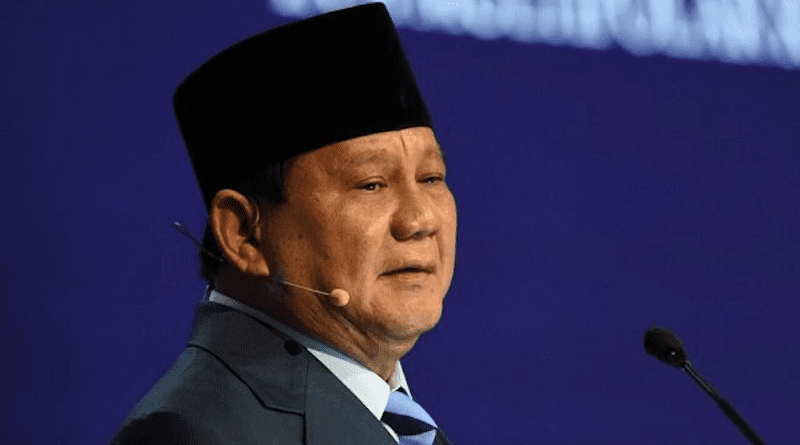Where Is Jakarta’s South China Sea Policy Heading Under Prabowo? – Analysis
By Pizaro Gozali Idrus
Prabowo Subianto’s foreign and defense policies have come under the spotlight after the former army general and current defense minister claimed victory in Indonesia’s presidential election this week.
Prabowo won almost 60% of the votes, according to several polling agencies drawing attention to his policies amid rising tensions in the South China Sea and the China-United States rivalry.
Indonesia is not a party to the South China Sea dispute but it has a strategic and economic interest in maintaining peace and stability there as its exclusive economic zone overlaps with several neighboring countries, as well as with the so-called nine-dash line that Beijing uses to claim China’s historic rights over most of the sea.
The South China Sea dispute has become one of Indonesia’s most important security issues and it could also ignite a major conflict between the United States and China, according to Aristyo Rizka Darmawan, a senior researcher at the Center for Sustainable Ocean Policy at the University of Indonesia.
Prabowo’s campaign documents state that Indonesia needs to prepare for future conflicts and plan how to reduce potential risks.
“Prabowo’s narrative on the South China Sea has been more about how we [should] have a strong defense capacity,” Darmawan told BenarNews.
Muhammad Zulfikar Rakhmat, a researcher at the National University of Singapore (NUS), said that the former general “has had a history of advocating for a more assertive and independent foreign policy for Indonesia.”
“His victory in the election might lead to a recalibration of Indonesia’s approach to the South China Sea issue and regional security,” Zulfikar told RFA. “Prabowo may prioritize strengthening Indonesia’s military capabilities in the disputed waters.”
Aristyo Rizka Darmawan said Prabowo would likely focus on building up the naval forces as a deterrent in the waters around the Natuna islands, where encroachments by Chinese fishing vessels and patrols have become regular.
“Defense and maritime capabilities of the Indonesian navy are important. With such a strategy, Prabowo would most likely implement a more assertive policy in the North Natuna Sea,” the senior researcher from the University of Indonesia said.
Strategic continuity
Indonesia is a founding member of ASEAN and under its chairmanship in 2023, the bloc and China embarked on a new round of draft agreement discussion for a Code of Conduct (COC) in the South China Sea.
However, Prabowo “has not offered any new ideas for promoting dialogue or accelerating the COC negotiations,” Darmawan said.
“Relying solely on military capabilities would not help much in maintaining peace and security in the contested waters. To show leadership in ASEAN, Indonesia should not only think of itself but also think of a bigger role in helping the region avoid escalation and conflict,” he added.
The new president will take a middle-of-the-road position on the South China Sea dispute without offering anything new, according to Muradi, a military analyst and professor of political and security studies at Padjadjaran University.
“It is clear that his politics will be more focused on domestic affairs. This is the characteristic of a soldier who was born and raised in the Cold War era,” Muradi, who goes by one name, said.
The analyst warned that the situation in the South China Sea is evolving and so is the threat from China to ASEAN. China’s military modernization is expected to be completed by 2027 and many predict that by then Beijing would be confident enough to wage an open conflict in the region and the U.S. would have to intervene to support its allies.
“This requires more fundamental steps, not just saying we need this or that but concrete actions,” he said.
Zulfikar from the NUS, meanwhile, said Prabowo’s stance on China and the U.S. Indo-Pacific strategy may not be straightforward.
“While he has expressed interest in cultivating closer ties with China, particularly in terms of economic cooperation, Prabowo has also emphasized the importance of maintaining Indonesia’s sovereignty and independence in its foreign policy,” Zulfikar said.
That may see Prabowo “seeking to enhance regional cooperation with ASEAN countries and other regional powers to address security challenges.”
“Prabowo may adopt a pragmatic approach, seeking to balance Indonesia’s relations with both China and the United States to maximize its own interests.”
“Regarding the U.S. Indo-Pacific strategy and AUKUS grouping [between Australia, the United Kingdom, and the U.S.], he may approach them cautiously, emphasizing Indonesia’s non-alignment stance while exploring potential benefits and risks associated with increased engagement with these initiatives,” the NUS researcher added.
Huong Le Thu, Asia deputy director at the International Crisis Group, said that she doesn’t “expect major changes in foreign policy as Prabowo takes over, not in the early days, at least.”
The former general repeatedly promised to continue the domestic and foreign policies of his predecessor, the popular president Joko Widodo.
“After all, ‘continuity’ was among the main aspects of his campaign,” she said, “If anything, I would expect more of the old – and old old – than of the new.”

